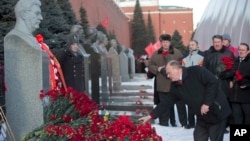Russians have marked the 60th anniversary of the death of Soviet dictator Josef Stalin, who holds enduring popularity despite his tyrannical leadership, which killed millions.
Hundreds of people gathered in Moscow's Red Square to lay flowers at Stalin's tomb Tuesday near the Kremlin Wall.
His body was buried there in 1961 as part of a de-Stalinization process, after being preserved in the Mausoleum of Vladimir Lenin, leader of the Bolshevik Revolution.
The head of Russia's Communist Party, Gunnady Zyuganov, attended the commemoration. He praised Stalin as a "distinguished state and political figure," and as a symbol of the nation's "great victories."
Stalin Still Widely Admired
An opinion survey on Stalin in Russia and the ex-Soviet states of Armenia, Azerbaijan and Georgia found the former Soviet dictator remains widely admired. The U.S.-based Carnegie Endowment for International Peace commissioned the report.
Carnegie report editor Thomas de Waal said Stalin’s popularity remains high because no proper de-Stalinization program has been carried out in the media or schools.
"It seems that Stalin is still there in peoples' minds, not only in Russia but in places like Georgia and Armenia as well, 60 years after his death, even though there are very few visual representations of him, very few statues or portraits," he said. "His shadow is still there."
De Waal said the poll also found that people do not fully understand the history of Stalin and his ruthlessness.
"I think one of the other things that this poll shows is a much higher level of indifference — not so much opposition, but indifference amongst younger people particularly in Azerbaijan, where 39 percent of younger people said they did not even know who Stalin is," he said. "So maybe Stalin is becoming a bit of a distant figure like ... Peter the Great or Ivan the Terrible — which is not so great. It would be important for people to have a proper discussion about the recent Soviet past. This poll shows that people are confused, that they do not really come to grips with the history of Stalin, but that they do not really want him back.”
A Tyrannical Ruler
Stalin ruled the Soviet Union from 1924 until his death in 1953 at age 74. Communists and other hardliners credit him with the defeat of Adolf Hitler in World War II and turning the Soviet Union into a nuclear superpower.
Critics condemn his tyranny. Historians estimate nearly one-million people were executed during his purges in the 1930s. Millions more died in his notorious Gulag prison camps and in his mass starvation system in Ukraine.
Hundreds of people gathered in Moscow's Red Square to lay flowers at Stalin's tomb Tuesday near the Kremlin Wall.
His body was buried there in 1961 as part of a de-Stalinization process, after being preserved in the Mausoleum of Vladimir Lenin, leader of the Bolshevik Revolution.
The head of Russia's Communist Party, Gunnady Zyuganov, attended the commemoration. He praised Stalin as a "distinguished state and political figure," and as a symbol of the nation's "great victories."
Stalin Still Widely Admired
An opinion survey on Stalin in Russia and the ex-Soviet states of Armenia, Azerbaijan and Georgia found the former Soviet dictator remains widely admired. The U.S.-based Carnegie Endowment for International Peace commissioned the report.
Carnegie report editor Thomas de Waal said Stalin’s popularity remains high because no proper de-Stalinization program has been carried out in the media or schools.
"It seems that Stalin is still there in peoples' minds, not only in Russia but in places like Georgia and Armenia as well, 60 years after his death, even though there are very few visual representations of him, very few statues or portraits," he said. "His shadow is still there."
De Waal said the poll also found that people do not fully understand the history of Stalin and his ruthlessness.
"I think one of the other things that this poll shows is a much higher level of indifference — not so much opposition, but indifference amongst younger people particularly in Azerbaijan, where 39 percent of younger people said they did not even know who Stalin is," he said. "So maybe Stalin is becoming a bit of a distant figure like ... Peter the Great or Ivan the Terrible — which is not so great. It would be important for people to have a proper discussion about the recent Soviet past. This poll shows that people are confused, that they do not really come to grips with the history of Stalin, but that they do not really want him back.”
A Tyrannical Ruler
Stalin ruled the Soviet Union from 1924 until his death in 1953 at age 74. Communists and other hardliners credit him with the defeat of Adolf Hitler in World War II and turning the Soviet Union into a nuclear superpower.
Critics condemn his tyranny. Historians estimate nearly one-million people were executed during his purges in the 1930s. Millions more died in his notorious Gulag prison camps and in his mass starvation system in Ukraine.








